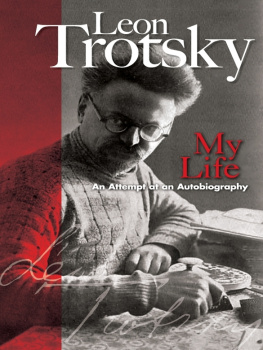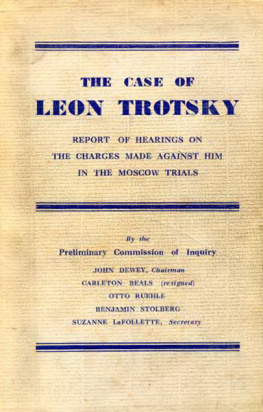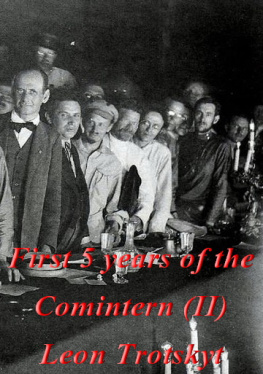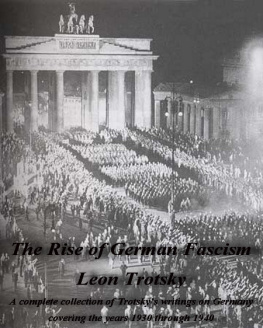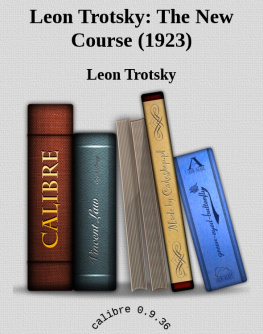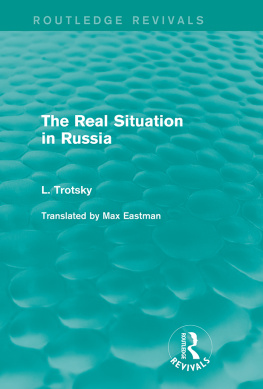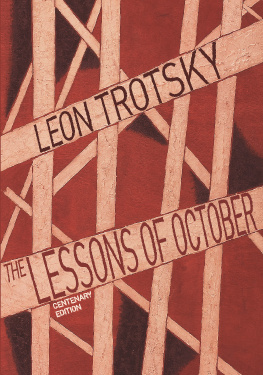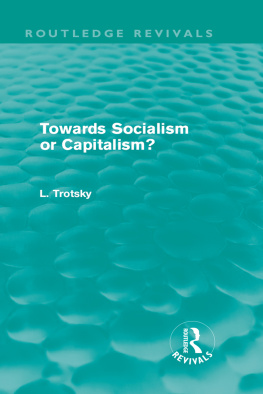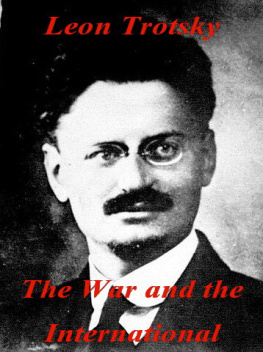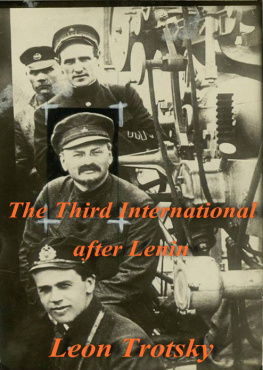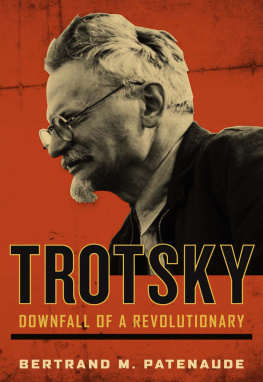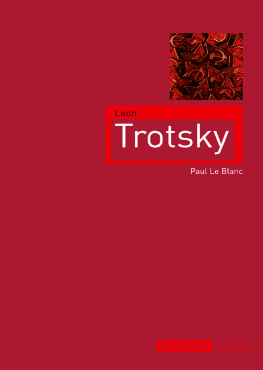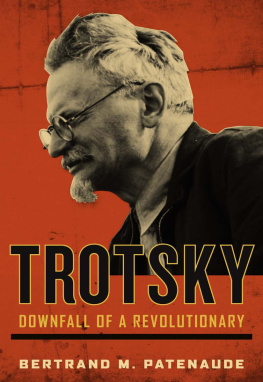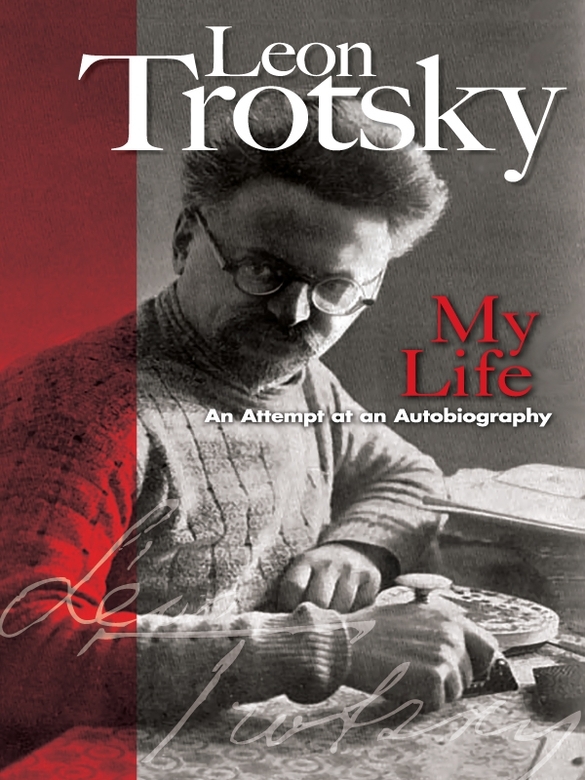CHAPTER I
YANOVKA
C HILDHOOD is looked upon as the happiest time of life. Is that always true? No, only a few have a happy childhood. The idealization of childhood originated in the old literature of the privileged. A secure, affluent, and unclouded childhood, spent in a home of inherited wealth and culture, a childhood of affection and play, brings back to one memories of a sunny meadow at the beginning of the road of life. The grandees of literature, or the plebeians who glorify the grandees, have canonized this purely aristocratic view of childhood. But the majority of the people, if it looks back at all, sees, on the contrary, a childhood of darkness, hunger and dependence. Life strikes the weakand who is weaker than a child?
My childhood was not one of hunger and cold. My family had already achieved a competence at the time of my birth. But it was the stern competence of people still rising from poverty and having no desire to stop half-way. Every muscle was strained, every thought set on work and savings. Such a domestic routine left but a modest place for the children. We knew no need, but neither did we know the generosities of lifeits caresses. My childhood does not appear to me like a sunny meadow, as it does to the small minority; neither does it appear like a dark cave of hunger, violence and misery, as it does to the majority. Mine was the grayish childhood of a lower-middle-class family, spent in a village in an obscure corner where nature is wide, and manners, views and interests are pinched and narrow.
The spiritual atmosphere which surrounded my early years and that in which I passed my later, conscious life are two different worlds, divided not only in time and space by decades and by far countries, but by the mountain chains of great events and by those inner landslides which are less obvious but are fully as important to ones individuality. When I first began to draft these memoirs, it often seemed to me as if I were not writing of my own childhood but of a long-past journey into a distant land. I even attempted to write my story in the third person, but this conventional form all too easily smacks of fiction, which is something that I should want to avoid at all costs.
In spite of the contradiction between these two worlds, the unity of the personality passes through hidden channels from one world into the other. This, generally speaking, accounts for the interest that people take in the biographies and autobiographies of those who, for one reason or another, have occupied a somewhat more spacious place in the life of society. I shall therefore try to tell the story of my childhood in some detail,without anticipating and predetermining the future, that is, without selecting the facts to suit preconceived generalitiessimply narrating what occurred as it is preserved in my memory.
At times it has seemed to me that I can remember suckling at my mothers breast; probably I apply to myself only what I have seen in the younger children. I have a dim recollection of a scene under an apple-tree in the garden which took place when I was a year and a half old, but that memory too is doubtful. More securely do I remember another event: I am with my mother in Bobrinetz, visiting the Z. family, where there is a little girl of two or three. I am the bridegroom, the little girl is the bride. The children are playing on the painted floor of the parlor; the little girl fades away; the little boy is standing dazed and petrified beside a chest of drawers. His mother and the hostess come in. His mother looks at the boy, then at the puddle beside him, and then at the boy again, shakes her head reproachfully and says : Arent you ashamed of yourself ? The boy looks at his mother, at himself, and at the puddle, as if it all had nothing whatever to do with him.
Never mind, the hostess says, the children have played too long.
The little boy feels neither shame nor repentance. How old was he then? About two years, possibly three.
It was about this time that I ran into a poisonous snake while walking in the garden with my nurse. Look, Lyova ! she cried, pointing to a bright object in the grass. Here is a snuff-box buried in the ground ! My nurse took a stick and began to dig it out. She herself was not more than sixteen years old. The snuff-box uncoiled itself, stretched into a snake, and, hissing, began to crawl in the grass. Ai ! Ai ! screamed my nurse, and, catching me by the hand, ran quickly. It was hard for me to move my legs fast enough. Choking with excitement, I told afterward of our finding in the grass a snuff-box which turned into a snake.
I remember another early scene that took place in our main kitchen. Neither my father nor my mother is at home. The cook and the maid and their guests are there. My older brother, Alexander, who is at home for the holidays, is also buzzing about, standing on a wooden shovel, as if on a pair of stilts, and dancing on it across the earthen floor. I beg my brother to let me have the shovel, and try to climb up on it, but I fall down and cry. My brother picks me up, kisses me, and carries me out of the kitchen in his arms.
I must have been about four years old when some one put me on the back of a big gray mare as gentle as a sheep, with neither bridle nor saddle, only a rope halter. I spread my legs wide apart and held on to the mane with both hands. The mare quietly took me to a pear-tree and walked under a branch, which caught me across the middle. Not realizing what the matter was, I slid over the mares rump, and hit the grass. I was not hurt, only puzzled.
I had almost no ready-made toys in my childhood. Once, however, my mother brought me a cardboard horse and a ball from Kharkoff. My younger sister and I played with dolls which we made ourselves. Once Aunt Fenya and Aunt Raisa, my fathers sisters, made some rag dolls for us and Aunt Fenya marked their eyes, noses and mouths with a pencil. The dolls seemed remarkable to me; I can remember them to this day. One winter evening our mechanic, Ivan Vasilyevich, cut a little railway-car with wheels and windows out of cardboard and pasted it together. My older brother, at home for Christmas, instantly announced that he could make a car too, in no time. He began by pulling my car to pieces; then he armed himself with a ruler, pencil and scissors, and drew for a long time. But when he cut out what he had drawn, there was no railway-car.
Our relatives and friends, when going to town, would sometimes ask what I wanted from Elizavetgrad or Nikolayev. My eyes would shine. What should I ask for? They would come to my help. One would suggest a toy horse, another books, another colored crayons, another a pair of skates. I want half-Halifax skates ! I would cry, having heard this expression from my brother. But they would forget their promises as soon as they had crossed the threshold. I lived in hope for several weeks, and then suffered a long disappointment.
A bee sits on a sunflower in the garden. Because bees sting and must be handled with care, I pick up a burdock leaf and with it seize the bee between two fingers. I am suddenly pierced by an unendurable pain. I run screaming across the yard to the machine-shop, where Ivan Vasilyevich pulls out the sting and smears a healing liquid on my finger.
Ivan Vasilyevich had a jar full of sunflower-oil in which tarantulas were floating. This was considered the best cure for stings. Victor Ghertopanov and I together used to catch these tarantulas. To do this, we would fasten a piece of wax to a thread and drop it into one of their burrows. The tarantula would seize the wax in its claws and stick tight. We then had only to draw it out and catch it in an empty match-box. These tarantula hunts, however, must have belonged to a later period.

